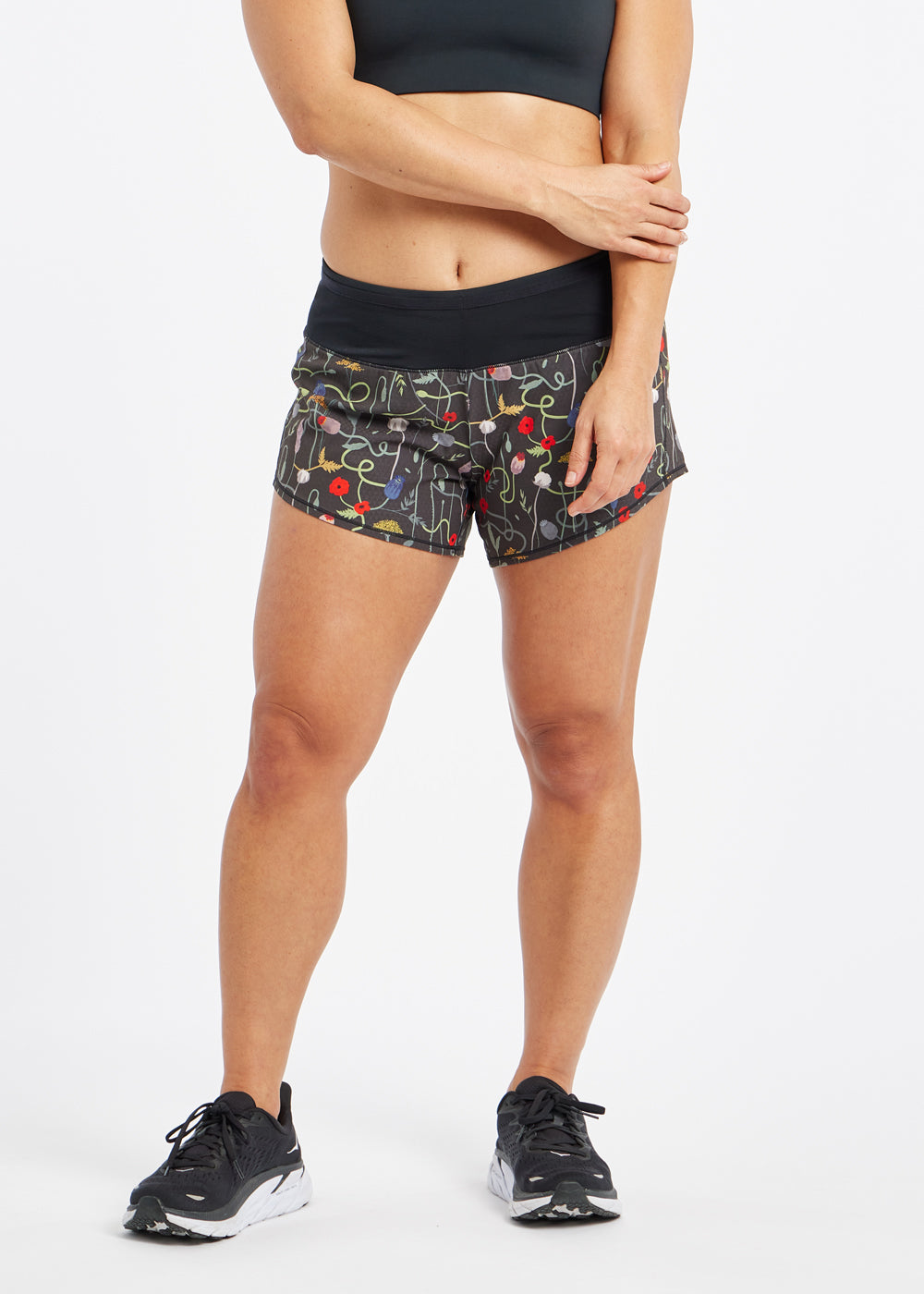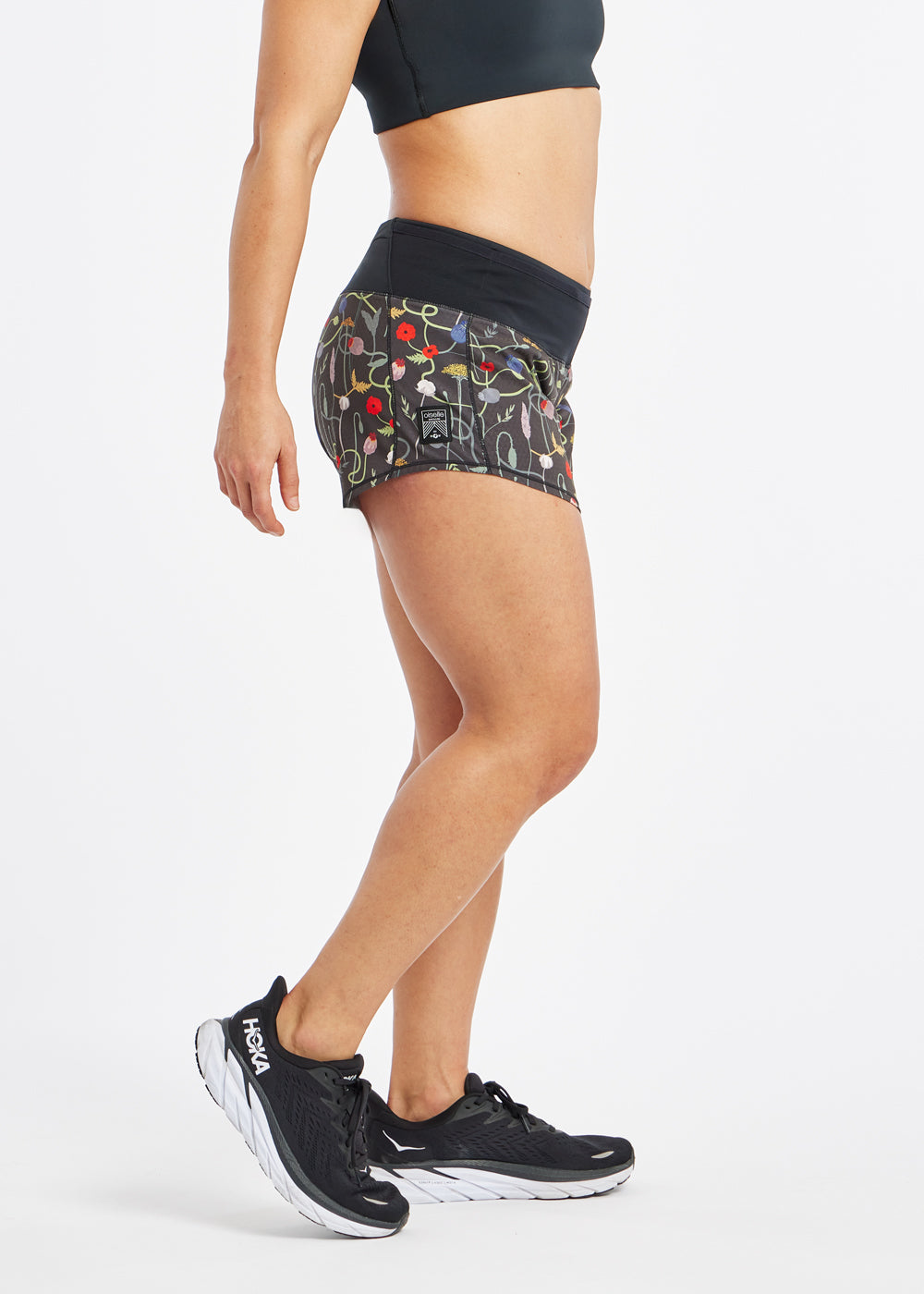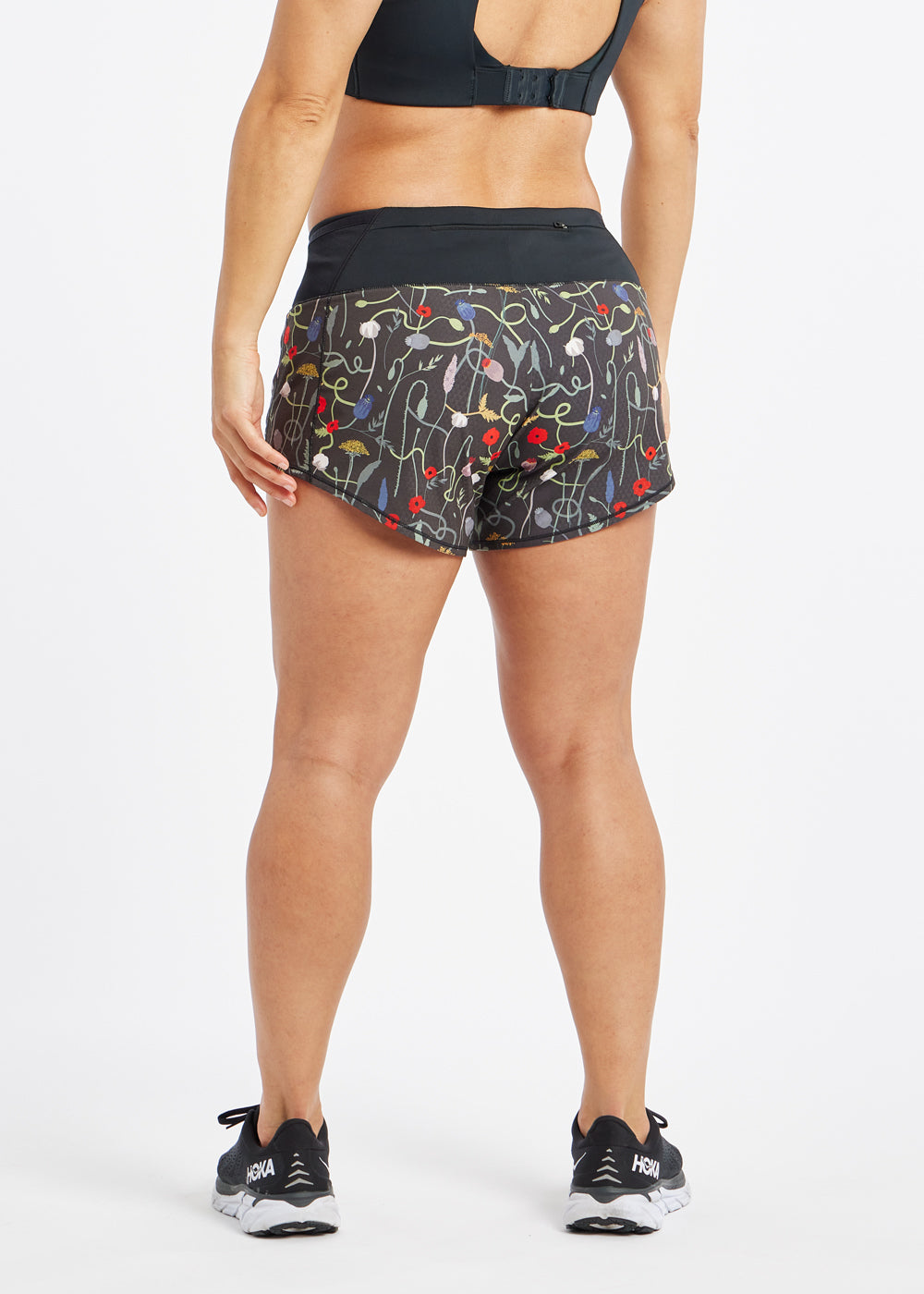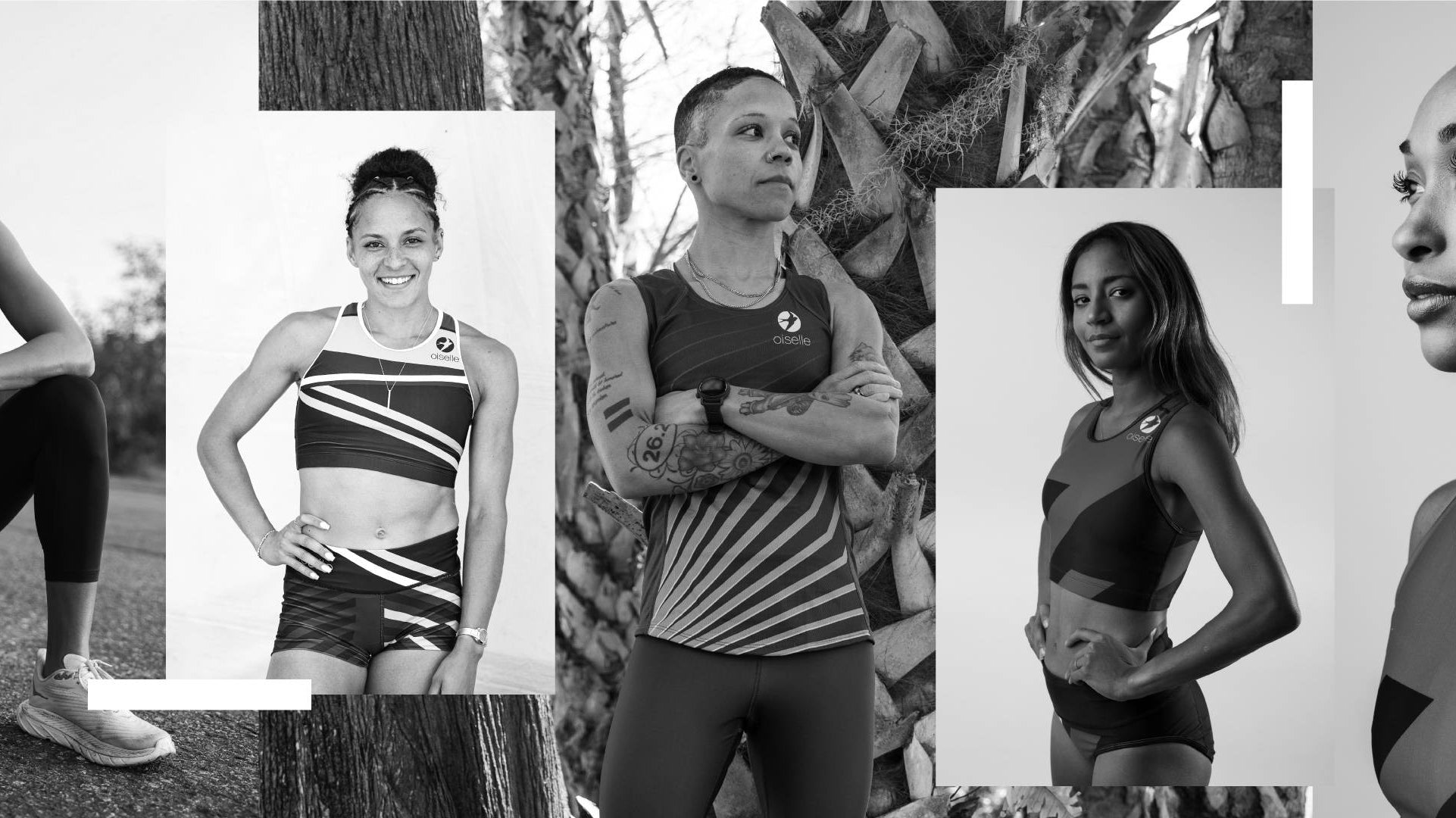We are excited to announce that Alison Mariella Désir is joining our Leadership Team in Seattle as the Director of Sports Advocacy. The newly created role combines community, culture, and movement building as the brand works to strengthen both internal team culture and outward facing community outreach with the goal of making running a more inclusive space.
This convo brought to you by Zoom, including short guest appearances from Amir and Kouri.
SB: This idea of you moving to Seattle and coming on board at Oiselle was such a dream. I almost felt ridiculous putting it out there last summer, when you Amir and Kouri visited. I’m pinching myself it’s coming true. What’s been the evolution of it for you?
AMD: I know. It felt really lucky that everything lined up. I mean, it felt like such a long shot. But now it’s happening. We have movers coming next week to pack up our stuff!
SB: That’s the sign you have truly arrived as an adult! Having others pack your stuff!
AMD: Haha, yes. It’s wild.
SB: Jumping right into the here and now, I thought I’d start with the events of the past few weeks. I’m curious where you were on January 6th, and what that day was like for you?
AMD: I was at home. I was getting info online, and then looking at CNN. I think the image that struck me was somebody at the Senate door, and they had guns drawn. It was like a scene from a movie. But it was also a perfectly reasonable conclusion to the vitriol and division that Trump had created. There was a feeling of helplessness, followed quickly by ‘what does this mean for my son?’ Thinking about the worst-case scenario. Would there be an inauguration?
But the reality is that all of the conditions that were there on Jan 6 still exist today. For some white folks that I spoke to after that, they had a moment to acknowledge wow, white supremacy is real.
It’s difficult not to feel that until things come to a head, until there’s an insurrection, people don’t believe Black and brown folks.
It’s problematic that, for a lot of white people, it’s only when it gets this bad that they see our truth. Or only when we save the day, as we did in Georgia, do Black women have an opportunity to be thanked and appreciated. And I do have a concern with the new administration now in office that many people will be lulled to sleep again.
SB: Yes, I was reflecting on the media’s constant coverage of “division in America” but on the other hand, maybe it’s better to see what’s there, so we can start fixing it. I also worry about it seeping back into the ground. But I’m also optimistic about the new learnings from last year. There’s a lot of new activists!
Backing up a little, I like hearing about your early college and young adult years, and maybe this is a little selfish or self-reflective on my part, but it’s in part because I think we had some similar patterns. Both of us went a bit feral in college, and we both contemplated becoming lawyers, but then moved on to completely different areas.
On the college years, I have often reflected that the wilding I was able to express as a youth fueled my sense of independence. But it’s tricky because sometimes that freedom was self-destructive. How do you think about those years, and how they shaped you?
AMD: I was thinking about this recently. I was thinking about it for Kouri. I hope that there’s a narrative that it’s okay to explore and be wild. Exploring things sexually and dating people. When I was in college, words like “easy” and “promiscuous” were used to describe women who were exploratory.
But through a different lens, men have freedoms, more partners, I mean my god, men are infantilized into their 40’s and 50’s. As I reflect, there were some serious dangers that I avoided. But I also believe it’s important to expand the narrative of what’s acceptable. Getting home at 3 am isn’t inherently dangerous, but being a Black woman in NYC coming home at 3 am is dangerous because of what others might do.
That’s part of why it’s great we’re coming to Seattle. I want to offer Kouri the chance to be outdoors. Climbing trees rather than playing video games. I want to instill in him a connection with nature and adventure.
SB: Speaking of Kouri, I know you’ve found it important to keep pictures of him off social media. What’s your thinking behind that?
AMD: I believe in keeping kids, and the identity of kids, off of social media. I want him to be able to go on social media when he’s ready. I want him to make that decision for himself. I don’t want to expose him or his story. Or use him as a marketing tool. It’s not sensitive to who he is or who he might want to be.
As a kid, my parents were told “oh she’s a cute little kid, you should have her do auditions or get into modeling” and my parents said that they wanted to wait until I could make that decision on my own. Haha, but of course, that’s hard because he’s so cute!
SB: SO. CUTE. I can’t wait to have some Kouri time. He was born in 2019. How did 2020 change you?
AMD: 2020 changed me because of Kouri. All of the things that happened, so much of my passionate work came into focus. It was more theoretical before Kouri. Before Kouri, I mean yes, I believed in human rights, everyone deserves access to freedom and safety, etc. But now with Kouri, all of my work is for him. I want to do this because I believe in it, but also because I have a human being who I want to have a good, safe life.
SB: When Ahmaud Arbery was murdered, it felt like you single-handedly caused the running industry to snap to attention. The article in Outside was incredibly moving, among other things you wrote during that time. What was that experience like?
AMD: It came from a really emotional place, thinking about my son. When I wrote that op-ed, it was all very personal. I mean, Tamir Rice was 11 or 12 when he was killed, right? There aren’t many years left until Kouri could be shot in the park. It was an explosion of emotion. I didn’t have any expectations. I put a call out to the running industry. But I didn’t think I would end up as an architect of what a different future could look like.
Now I’m in this position, with the Running Industry Diversity Coalition where I can be part of that. I can be a visionary. I can be executing this. And for me, there was suddenly more attention. I love the quote, “It takes ten years to be an overnight success.” I’ve been in the industry for a while. Suddenly I had more eyeballs. And I just wanted to make the most of it. Collaborate.
In the end, all of my work is about making the world a safer place for my son.
SB: One of your superpowers is your strength as a communicator. You’re an empath who can bring people together. Have you always been aware of that power?
AMD: Yes, but it wasn’t framed as a power! When I was in elementary school, I was called “a social butterfly”. Always talking to people. And that’s an interesting framework, isn’t it? Boys don’t get described that way. Rather than honing that talent, there was a desire for me to sit quietly in a chair.
One time, in grad school, there was an expectation that I take a leadership role, coalesce the group. Haha, I just didn’t want to. And then it became ‘why won’t Alison take the lead?’ So I didn't always want to be that person. But I now embrace it. It's also so powerful to uplift others, and help them recognize their own abilities. I don’t want to be the savior.
SB: So one of the funny memes you shared with me in 2020, and I know you did with others too, was the meme that said something like: “The clitoris has 10,000 sensors on it and it’s still not as sensitive as a white person being asked to confront their own racism.” Lol, I mean… how do we change that?
AMD: I think it’s got to be a cultural shift. Unfortunately, part of being an American is not being open to acknowledging your flaws. Individualism. Pulling yourself up from your bootstraps. So much of it denies vulnerability. There’s this idea that if you’re vulnerable and show your flaws, you’re weak or not intelligent. Even mental illness is still widely regarded as a personal flaw. That’s what makes it so hard for white people to discuss and accept; to talk about the fact that racism is like the air we breathe, embedded into everything, and therefore they’re complicit.
But we need to talk about it at so many levels. Education. So many sectors. We need to not be in a place of denial. I mean, look at Covid, people continue to deny what’s true and right there. 400K people dead. We deny the virus is in the air and people are dying. It’s become anti-American to criticize the US. When clearly, protesting is part of our heritage.
Amanda Gorman said it well at the inauguration: Being American ...is the past we step into and how we repair it.
SB: Yes, I recently read a piece about feedback within organizations, which most people loathe, both giving it and getting it. But the article made the pitch that if you create a feedback-rich, or conversation-rich culture, where being vulnerable and talking about important things is common, then it doesn’t have to be this momentous act with tons of weight. I think talking about race can be that way too. Can we find a way to make it more common, less jarring?
AMD: Agree. It’s also in what we model. Modeling openness. We talk about this in psychology If someone comes in the room and their body is closed, arms crossed, it communicates a ton. You as a therapist can model openness, having an open body position. Creating a sense of trust and that it’s okay to be vulnerable in the room.
SB: One of the things that I’m very grateful for in our relationship is trust. We cannot erase our racial differences, but we can have a rapport that makes it okay for us to share a range of emotions, thoughts, ideas, concerns. Even things that are difficult.
AMD: Yes, I had someone ask me recently “What does allyship look like?”
A big component of it is trust. That doesn’t mean that there aren’t still difficult moments or conversations in cross-racial relationships. But the more I can throw things out without feeling as though I have to qualify them, the better. Like - I know that can come into work at Oiselle HQ with my hair looking like this (nappy and natural). That’s a small but real show of trust and respect -- I can just be myself.
SB: Well we’re looking forward to all of that self (and Amir and Kouri) being in Seattle. The hype train is going strong at O! We’re so ready to have you join us on the leadership team, both inside the company and within our community, as Director of Sports Advocacy. It’s a role that combines community, culture, and movement building. What are you most excited about?
AMD: What comes to mind immediately is the power of the Volée. The Volée can and should be global. A 100K strong community. There’s such an opportunity for togetherness, support, and power building. I mean, all of us coming together and raising $300K for Black Voters Matter last fall, wow. The running industry needs that kind of connection!
Oiselle is just so uniquely positioned. On top of making beautiful clothes, and making women feel powerful in their bodies, the Volée is a force. Personally, I think we need to start getting into policy, pushing issues that matter to us as runners: environmental justice and stewardship of the land. Those are runner issues. I’m also excited about the Bras for Girls Program.
Oiselle has an amazing opportunity to engage the next generation of athletes thru the Bras for Girls Program, and then support them at the highest level later in life; we can make sure that there’s a clear talent pipeline!
SB: Yes! I love that so much. A pipeline of girls to women to fierce leaders! What’s your role with the Running Industry Diversity Coalition, and how is that evolving?
AMD: I’m a co-chair. At this point, we recognize there needs to be paid staff. For the time being, I’ll continue to be out front. But I’m really excited to find the person who can eat, breathe, sleep this thing. It’s a big responsibility to take on all aspects of the running industry. I’m excited to work collaboratively and I will forever uplift the work. But right now, my priority is Kouri and Amir, of course, and this new position with Oiselle.
SB: In terms of O product, what are you loving the most these days? You look fab right now in the new Hey Hacci Short Sleeve in Black by the way. Very sharp!
AMD: I love this. I’m going to wear it out and everywhere. I love having my room temperature cool, but to be warm, so this outfit is perfect. I’m also loving the new Flow styles. The Crackle one! I was also really impressed with the warmth of the Flyout Tights.
That’s what it’s all about: Feeling comfortable and powerful and beautiful. The line is clearly designed by women, for women. I don’t feel self-conscious. I feel good and strong. Oh and I’m obsessed with the Lux Cropped Pants.
I noticed recently on the Volée app, people were talking about who is their body person, when they look for how things fit, and someone said it was me. “Alison is the one I look for at my body shape.”
I’ve been with other brands where a body like mine would never be approved for a photo because it doesn’t look like the ideal standard they’re going for. So it feels important, this work with Oiselle.
SB: And of course, there will be the AMD sock collection, and I’ll let out another secret: an AMD apparel collection in 2022. So much good ahead in the product world. What do you think that will feel like?
AMD: The way I think of it, if I was a singer, and heard my song on the radio. It’s such a legacy moment. And I love everything about it. I love how the sock designs wove in my Haitian identity and the things that are important to me.
SB: Following the incredible success of Womxn Run the Vote Relay, where we raised $270K for Black Voters Matter in 2020, what are you thinking about as we look ahead to 2021?
AMD: I really hope that we do something around public lands. Runners can and should be connected to environmental justice. And environmental justice is connected to racial justice. And the commitment to uplifting and supporting indigenous voices. If you’re a climate justice activist, you must also be a racial justice activist.
SB: Amen. We can’t wait to keep elevating those topics and causing good trouble with you. Let’s do this, shall we?
AMD: Yes! See you next week!




































































































































































Comments
Fantastic choice in working with Alison Mariella Desir! This is what the running community needs more of! Inclusivity and social justice convention/action. I’m exited to support this brand from now on! Congrats Oiselle!
Brava Alison!